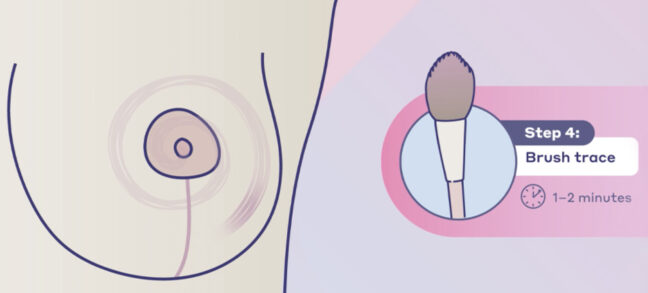When a friend is diagnosed with breast cancer or the BRCA gene mutation, it can be difficult to know exactly what to say or do to support them. Many offer up words of encouragement, run errands, send cards, or drop off gifts. Whatever the gesture, this support can play an important role in your friend’s breast cancer journey.1
However, it’s important to remember this is a complicated time. The emotional and practical needs surrounding a diagnosis are deeply personal and can change depending on where your friend is in both her life and her care.2,3 With this in mind, there are a few ways you can be there for her as she makes her way through diagnosis, treatment, recovery, and beyond.
1. listen
Because each journey is uniquely personal, the number one thing you can do to support your friend during this time is to listen to what she needs and respond accordingly. She may not always feel comfortable expressing her needs, but give her the space to do so when she’s ready. Look for other ways to listen, as well. Read her posts if she’s blogging about her experience, review websites she’s set up to coordinate support (e.g., Meal Train, GoFundMe, CaringBridge), or ask her caregiver or family how you can help.
2. let them feel what they need to feel
Depending on where she is in her treatment and recovery, your friend may be feeling anxious, vulnerable, and fearful on top of being physically exhausted.2 This is a natural part of the breast cancer experience. While it’s just as natural for you to want to cheer her up and encourage her to look at the positives, sometimes the best thing you can do for her is to let her feel her emotions. She may simply need you to say, “I’m so sorry. I’m here.”
3. be present on their terms
At almost any stage of the breast cancer journey, fatigue can take its toll.4 That means your friend may not always be up for a visit, phone call, or dinner drop-off. Let her know you’re here for her without imposing. Offer up open-ended invitations: “I’d love to stop by to help out with laundry—let me know what works for you.” Send a note with an offer to chat whenever she’s ready. Get her a gift card for meal delivery, so she can order when she’s feeling up to eating.
4. refrain from offering uninvited advice
You may feel a desire to “fix” things for your friend with advice—advice based on articles you’ve read, stories about a friend of a friend who survived cancer, or your own brush with illness. While this advice may be well intentioned, it may not be what your friend needs. Wait until she invites you to share your perspective before you offer your input.
5. be prepared if they do ask
Some women do look to friends and family to support them as they make decisions about their care.5 This comes as no surprise when you consider the complexities of this journey. More information and answers may allow her to feel more confident in her choices, so be ready if she asks for your help.6 Act as a research assistant as she explores her options, and advocate for her at her appointments to make sure all her questions are getting addressed.
6. respect her story
With so many people sharing their lives and seeking support through social media, it may seem natural to talk about your friend’s experience on your social channels. But it’s important to remember this is her story. Ask her permission before you post and respect her right to say “no.” If she says, “yes,” you may choose to re-share her own posts or link to her blog articles to ensure you’re not divulging too much.
7. introduce her to safe spaces
Your friend may not feel comfortable with her story being introduced to the wide-open world of social media, but she still may want a place to share, seek advice, and get support. Offer to connect her to other thrivers you know or introduce her to groups and communities designed for women who have been diagnosed with BRCA or breast cancer.
8. distract with fun
There are bound to be many difficult days for your friend along her journey. The day after diagnosis. The first day of treatment. The day she goes swimsuit shopping after a mastectomy. The day she starts to lose her hair due to chemotherapy. Keep these dates in mind and try to do something fun and special for her. Send balloons to cheer her up during the toughest moments. Put together a treatment care kit with funky cozy socks. Have a spa day to support her after her first head shave. Just make sure the fun is tailored to who she is and what she needs.
9. leave room for normalcy
A breast cancer diagnosis can be disruptive. New emotions come in waves. Your body changes. Your schedule shifts to accommodate treatment. It impacts your life every single day.7 In between the disruptions, your friend may just want moments of normalcy.8 Allow her the space to have conversations that aren’t just about her diagnosis. When she’s feeling up to it, tell her your latest funny work anecdote, watch The Bachelor together, enjoy the little things you did together before the diagnosis.
10. remember, the journey doesn’t end after treatment
When her treatment comes to an end and she’s entered recovery, your friend still needs your support. It can be jarring to go from being surrounded by friends and loved ones to life-as-usual after treatment. Many women feel abandoned in this phase.7 Be sure to check in on her. Ask her how she’s handling the transition. Let her know that it’s okay to still struggle with fear, anxiety, and stress, and that you’ll be there to continue to offer support whenever she needs it.7
- Hinzey A, Gaudier-Diaz MM, Lustberg MB. Breast cancer and social environment: getting by with a little help from our friends. May 26, 2016. doi:10.1186/s13058-016-0700-x.
- Hewitt M, Herdman R, Holland J, eds. Institute of Medicine and National Research Council National Cancer Policy Board. Meeting Psychosocial Needs of Women with Breast Cancer. Washington, D.C.: National Academies Press; 2004.
- Waring AN. Breast cancer: reactions, choices, decisions. Ochsner J. January 2000;2(1):40-46.
- Bardwell WA, Ancoli-Israel. Breast Cancer and Fatigue. Published in final edited form as: Sleep Med Clin. March 2008; 3(1):61-71. doi:10.1016/j.jsmc.2007.10.011.
- Wallner LP, Li Y, McLeod MC. Decision‐support networks of women newly diagnosed with breast cancer. Cancer. June 22, 2017. https://doi.org/10.1002/cncr.30848.
- Livaudais JC, corresponding author: Franco R. Breast cancer treatment decision-making: are we asking too much of patients? Nov 15, 2012. doi:10.1007/s11606-012-2274-3.
- Research associate corresponding author: Williams F, Jeanetta SC. Lived experiences of breast cancer survivors after diagnosis, treatment and beyond: qualitative study. May 7, 2015. doi:10.1111/hex.12372.
- Leonard KE, Kalman MA. The meaning of touch to patients undergoing chemotherapy. Oncology Nursing Forum. September 2015;42(5).
Resensation Articles

How does mastectomy impact the nerves in the breast?
One sometimes overlooked aspect of mastectomy is its impact on nerves. Read what happens to nerves during mastectomy and explore…
Read More
What happens during implant breast reconstruction with Resensation®?
By repairing sensory nerves, Resensation® enables you to potentially regain sensation to your chest. Read how this procedure works during…
Read More
how resensation® helped Leanna feel secure in her family’s future
With Resensation®, Leanna can be there to watch her kids grow up—without losing the feeling of being whole.
Read More
post-surgery sensory retraining: instructions and video guide
Sensory retraining is a series of exercises designed to help you reconnect with your body after breast reconstruction with Resensation®.
Read More